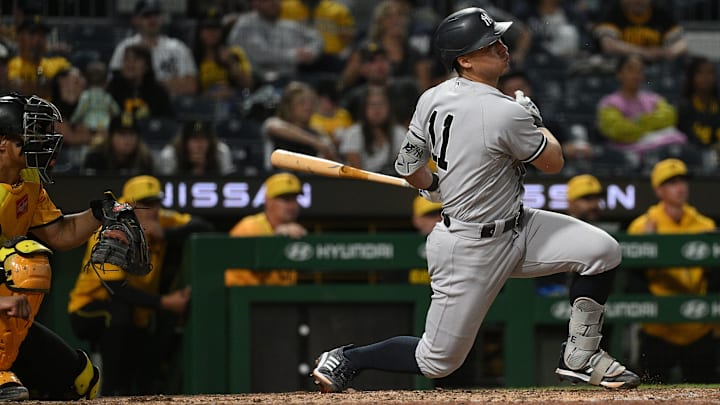Everywhere you look, baseball's shrewdest teams are getting lightyears ahead of potential pitfalls down the line by extending their hottest rookies on lengthy (but still bargain) contracts.
Corbin Carroll became a D-Back for life (or, at least, the portion of his life that lasts through 2031) prior to Opening Day of 2023. The team bet on a Rookie of the Year campaign, and they've been proven correct, risking only $111 million to buy out up to three free agent years and his full arbitration cycle. The Atlanta Braves have done this time and again, drawing ire for the minuscule figures owed to Ozzie Albies while still getting silent claps from the baseball community. Ronald Acuña Jr., 2023's likely NL MVP, is under contract through 2026 at a pittance, with team options in place for 2027 and 2028. $100 million used to be the number (that's where Acuña's deal landed). Now, the sum is likely higher for prospect hotshots, but it's still an affordable number for big-budget teams like the Yankees to risk, considering nobody wants to pay $360 million down the line for Aaron Judge if they don't have to.
Only issue, as far as the Yankees are concerned? They haven't, uh, developed anyone else lately. They chose not to go down this path for Gleyber Torres, which has been proven shrewd; the hard-hitting second baseman is inconsistent and might not be a cornerstone of this team's future. For whatever reason, they broke their own mold for Luis Severino and Aaron Hicks. Both deals were cheap, but they were also both disasters. Judge? Cano? One left, one stayed, but both swelled in cost in defiance of the Yankees' stubbornness in earlier years.
The Yankees still won't have any no-brainer extension decisions to make when 2023 wraps, but they've at least begun to enter the arena, thanks to the start of a new class of young players finding their way to the show. This used to be how small-market teams beat the system; think the Rays extending HE WHO MUST NOT BE NAMED in November 2021. Now? It is the system, and the Yankees might have to mess around next winter, if not this one.
JUST MISSED: Clarke Schmidt, who plowed past his career high in innings in 2023 (Previous High: 90.2 back in 2019) and pitched solidly, if unspectacularly, after a difficult start. After finding his footing during an elite summer stretch, he posted seven consecutive outings of 5.20-ERA baseball as fatigue likely set in. Schmidt seems like a very likeable starter/bulldog and potentially a solid No. 4. He also seems like someone the Yankees are more likely to sell high on than commit to.
Assessing 3 possible way-too-early Yankees extensions: Yes or No?
Anthony Volpe, SS
Considering Anthony Volpe's emergence is the singular reason the Yankees decided not to entertain the high costs of free agent shortstops like Corey Seager, Carlos Correa, Trevor Story and Marcus Semien, it's only natural that he should be the most prominent name atop their list of long-term priorities.
Of course, given that their reliance on Volpe to fill a shortstop hole was due, in large part, to the 22-year-old being on a rookie contract, the Yankees probably won't be terribly enthusiastic about paying him a lump sum after Year 1 -- especially a Year 1 that many viewed as slightly disappointing.
It's not tough to play around with Volpe's numbers and find a high-quality player; 20 homers and 20 stolen bags (a rarity for any Yankee, let alone a rookie) speaks for itself. But, at the end of the day, Volpe is a developmental project, not a finished product. This is a ~.210 hitter who woke up from a slumber in the summer, made tangible progress, but didn't sustain it into a piping hot finish.
He's certainly looked like a long-term solution for the Yankees at times this season, and the tools (and intangibles) are there. But the Yankees probably won't want to move too fast here. If he takes a second-year leap forward, they should lock in an extra two prime years next winter when things are only slightly more expensive.
VERDICT: Maybe in 2024.
